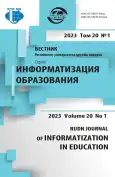Examining the attitudes of students’ towards using computer assisted language learning in foreign language classrooms
- 作者: Kazykhankyzy L.1, Rizakhojayeva G.A.1, Turlybekov B.D.1, Akeshova M.M.2
-
隶属关系:
- Khoja Akhmet Yassawi International Kazakh-Turkish University
- International University of Tourism and Hospitality
- 期: 卷 20, 编号 1 (2023)
- 页面: 33-40
- 栏目: DIGITAL EDUCATIONAL ENVIRONMENT
- URL: https://journal-vniispk.ru/2312-8631/article/view/321286
- DOI: https://doi.org/10.22363/2312-8631-2023-20-1-33-40
- EDN: https://elibrary.ru/BREJGU
- ID: 321286
如何引用文章
全文:
详细
Problem statement . The use of technology determines the level of development of a country. The issue of technology adaptation in the field of education is important to secure technological integration. Due to the success in providing equality of opportunity to the entire population, the use of communication technology in the field of education is becoming more and more widespread in this context. In recent years, the significance of technological integration in the sphere of education has become apparent. A great number of research conducted on the views of students towards integrating computer assisted language learning (CALL) into the language learning classrooms, however, few studies addressing the attitudes of students towards using CALL in the Kazakhstani contexts exist in the field of language teaching. The aim of this study was to examine university level students’ attitudes towards the use of computer assisted language learning in Kazakhstan. Methodology . The quantitative method of research by analyzing the data collected through survey with the help of SPSS Statistics 23.0, as well as questionnaire developed by M. Vandewaetere and P. Desmet to measure attitudes of students towards the use of computer assisted language learning were applied. The participants of the study were 126 EFL pre-service teachers enrolled at Foreign Languages Teaching Department of Khoja Akhmet Yassawi International Kazakh-Turkish University. Results . The participants have overall positive attitudes towards using CALL in the language classroom. The difference between participants’ attitudes towards using CALL according to their age of study at the university was revealed. It was found statistically significant differences between first year and second year students and first year and third year students’ views towards using CALL in language learning. Conclusion . Further research studies might be conducted in the form of mixed design in order to get more detailed information to support or understand the general results found with the help of questionnaire.
作者简介
Lazura Kazykhankyzy
Khoja Akhmet Yassawi International Kazakh-Turkish University
Email: lazura.kazykhankyzy@gmail.com
ORCID iD: 0000-0002-4155-6430
PhD, senior lecturer
29 B. Sattarkhanov Ave, Turkestan, 161201, Republic of KazakhstanGulnara Rizakhojayeva
Khoja Akhmet Yassawi International Kazakh-Turkish University
编辑信件的主要联系方式.
Email: gulnara.rizahodjaeva@ayu.edu.kz
ORCID iD: 0000-0002-6791-243X
PhD, Assistant Professor
29 B. Sattarkhanov Ave, Turkestan, 161201, Republic of KazakhstanBerdibay Turlybekov
Khoja Akhmet Yassawi International Kazakh-Turkish University
Email: berdibay_73@mail.ru
ORCID iD: 0000-0003-2616-1809
Candidate of Sociological Sciences, Associate Professor
29 B. Sattarkhanov Ave, Turkestan, 161201, Republic of KazakhstanMadina Akeshova
International University of Tourism and Hospitality
Email: madina_shakh@mail.ru
ORCID iD: 0000-0002-4217-1858
PhD, Assistant Professor
Rabiga Sulatan Begim St, Turkestan, 161201, Republic of Kazakhstan参考
- Smith RC. The UNESCO convention on the protection and promotion of the diversity of cultural expressions: building a new world information and communication order? International Journal of Communication. 2007;1(1):31.
- Li L. New technologies and language learning. Bloomsbury Publishing, Palgrave Macmillan; 2017.
- Januszewski A, Molenda M. (ed.) Educational technology: a definition with commentary. Routledge; 2013.
- Soleimani H. Computer assisted language learning: theory and practice. Iran: Payame Noor University; 2021.
- Levy F. How technology changes demands for human skills. Massachusetts Institute of Technology; 2010.
- Kessler G, Hubbard P. Language teacher education and technology. In: Chapelle CA, Sauro S. (eds.) The Handbook of Technology and Second Language Teaching and Learning. Wiley-Blackwell; 2017. p. 278-292.
- Uzunboylu H. Assessment of student scores based on specific variables in the web-assisted English grammar exercises. World Journal on Educational Technology: Current Issues. 2019;11(3):205-219.
- Elaish, MM, Shuib, L, Ghani, NA, Yadegaridehkordi, E, & Alaa, M. Mobile learning for English language acquisition: taxonomy, challenges, and recommendations. IEEE Access. 2017;5:19033-19047.
- Symonenko, S, Zaitseva, N, Osadchyi, V, Osadcha, K, & Shmeltser, E. Virtual reality in foreign language training at higher educational institutions. Tavria State Agrotechnological University; 2020.
- Patton, R, Chappelle, N, Fisher, U, McDowell-Burns, M, Pennington, M, Smith, S, & Vitek, M. Teaching general systems theory concepts through open space technology: reflections from practice. Journal of Systemic Therapies. 2016;35(4):1-10.
- Olibie EI. Using computer-assisted language learning to improve students’ English language achievement in universal basic education. International Journal of Educational Research and Technology. 2010;1(1):66-71.
- Siedlecki SL. Understanding descriptive research designs and methods. Clinical Nurse Specialist. 2020;34(1):8-12.
- Creswell JW. A Concise Introduction To Mixed Methods Research. SAGE Publications; 2014.
- Creswell JW, Poth CN. Qualitative inquiry and research design: choosing among five approaches. SAGE Publications; 2016.
- Vandewaetere M, Desmet P. Introducing psychometrical validation of questionnaires in CALL research: the case of measuring attitude towards CALL. Computer Assisted Language Learning. 2009;22(4):349-380.
- Abuseileek AF. Cooperative vs. individual learning of oral skills in a CALL environment. Computer Assisted Language Learning. 2017;20(5):493-514.
- Rahimi M, Yadollahi S. Computer anxiety and ICT integration in English classes among Iranian EFL teachers. Procedia Computer Science. 2011;3:203-209.
- Öz H. Investigating the relationship between foreign language learning and call attitudes among EFL freshman students. Procedia-Social and Behavioral Sciences. 2015;176:1041-1049.
- Lai, CH, Yang, JC, Chen, FC, Ho, CW, & Chan, T. Affordances of mobile technologies for experiential learning: the interplay of technology and pedagogical practices. Journal of Computer Assisted Learning. 2007;23(4):326-337.
- Son J-B. Context-specific computer-assisted language learning: research, development and practice. APACALL; 2019.
补充文件









